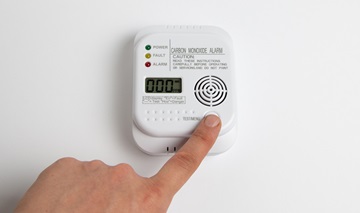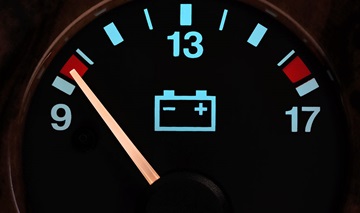How to Jump a Car With a Portable Jump Starter or Jump Box
Did you know you don’t need jumper cables to jump start a car? Not if you have a portable jump starter.
Also called jumper packs, jump starters or booster batteries are compact devices designed to jump a car. A jump starter takes less than a minute to jump a car, but it may take several hours to fully charge a car. That’s because of its impressive power capacity. It takes between 400 and 600 amps to jump a car, depending on the dead vehicle’s engine type, the kind of battery it's used to, and how warmed up the engine is. Most portable car battery starters carry that much and more.
They come in various sizes from a handheld brick to the size of a large tote bag. Some have USB ports to recharge phones and tablets while traditional jump starters only come with big clamps.
You don’t need to ask for help with a jump.
Grab a portable jump battery at your nearest Interstate All Battery Center. Let’s go!
If you’re worried about calling for roadside assistance, these portable batteries offer a fast, safe, handy and cost-effective alternative jump-starting. Also, if you’re in the habit of offering a jump to other people, then consider picking up a portable jump starter instead of connecting cars. Any jump start could damage the donor car if voltage spikes in the connection or if the car with the weak battery has significant electrical problems.
A jump box solves all of that. Here’s how to use one.
Step-by-Step Guide to Using a Portable Jump Starter
Using a jump box is straightforward: After some safety steps, you’ll connect the portable jump starter to the battery terminals, turn it on and then start your car.
A jump starter is a safer way to jump a car because it only has 13 volts, low enough to protect your car from any overloads. Every time you jump start a car or work with an open engine, it’s vital that you follow some basic safety steps.
1. Before Using Your Portable Jump Starter, Follow These Safety Precautions
- Read the manufacturer instructions. Make sure you understand how your jump box works and what each light means before you connect it to a car’s battery.
- Take off jewelry. Take off your jewelry anytime you get near an open car hood, and that goes for using a portable jump starter as well.
- Put on protective gear. Wear safety glasses and nitrile gloves, if available. A set of sunglasses and leather work gloves can work, too.
- Make sure you know the cables. Find the positive and negative clamps that go with your fully charged jump starter or jump box. The positive clamp is usually red, and it will also be clearly labeled with a positive sign (+) while the negative is usually black and marked with a minus sign (-). If it’s not clear, check your portable jump starter’s instructions.
With those clamps in hand, you’re ready for the next step, connecting your portable jump starter to the dead battery vehicle.
2. Connect the Jump Starter to the Dead Battery.
First, attach the portable jump starter’s red clamp to the battery’s positive terminal, marked with a positive sign. It’s usually (but not always) the red terminal. Then connect the negative clamp to the negative terminal.
A reliable jump starter device will have an indicator light to show that it’s connected to the battery posts and ready to jump your car. If you don’t see a light, you may need to turn it on. Again, check the instruction manual for your specific jump box.
Make sure that the jump box is sitting safely, away from moving parts and not likely to fall into the engine block if the vehicle shakes when it starts.
Once everything is connected, wait a moment before starting the ignition.
3. Start the Vehicle with the Dead Battery.
If the engine doesn’t start on the first try, don’t try it again. You could damage the jump box or your car’s starter. Disconnect it and check the portable jump starter power level before trying again. If it’s warm or depleted at all, recharge it before trying again.
If the jump starter is cold, you may not have a good connection. Look on the positive clamp and negative clamp for corrosion or any other issue that might have interrupted its connection to the battery terminals.
Otherwise, the engine should start if the problem is a dead battery. As soon as you can, disconnect your portable jump starter carefully.
When you get a jump, you need a new battery.
Drained batteries get damaged fast. Go to an Interstate All Battery Center location for a new battery.
4. Remove the Jump Starter Carefully
Disconnect the black clamp first. Also, make sure the two clamps do not touch the battery. Carefully lift everything away from the engine. If any of the clamps touch the battery and you see a spark, that electrical surge could damage your car’s onboard computer system or any of the sensitive electronics.
Your jump starter needs to recharge. We strongly recommend storing your portable jump starter indoors and away from the temperature extremes outside. Most portable jump starters use lithium-ion battery cells, and high temperatures can permanently damage them. If possible, leave the jump starter charging at home or take it to your next stop and recharge it there.
Now, your engine is running. That’s good news! However, you’re not done.
Using a portable jump starter pack is only a temporary fix.
Your next stop should be your favorite battery store for a battery test. They can do more than check how much power is in your car battery. It’s a comprehensive charging and electrical system analysis. The team can identify whether you need a professional auto repair or a simple battery replacement.
Troubleshooting Common Issues While Using Your Jump Box
Jump starting your battery is not a long-term solution for battery emergencies, yet these devices work well in a pinch.
Is it time for a fresh start?
Visit an Interstate All Battery Center location near you for a free battery test to find out!
Is the jump box on? One of the first things to check whether you need to turn it on. You’ll see indicator lights on most jump starters when there’s a successful connection. You’ll also see how much power it has.
Is your jump starter charged up? If it’s not, it’s not going to start the car. Give it several hours to charge, and another hour to cool down its temperature before connecting it to the car battery.
Is there too much corrosion? The next thing to check is the connection. If there’s corrosion, if the alligator clips aren’t secure, if you have the wrong polarity, the jump box will signal that you don’t have a strong connection. You may need to clean the corrosion off.
Do the cables keep slipping off? You may need to find a safe location in the engine compartment to place the jump starter so that the cables stay connected to the terminals. Don’t balance it on any movable parts.
Is the jump box broken? Most jump boxes are lithium-ion batteries, meaning they have a small computer inside to protect their cell, called a battery management system. They’re also reading voltage and amperage on their circuit, watching for how much power they need to give. They’re not prone to software glitches, but if they’ve been severely drained or attached to an overloaded circuit, the jump starter may not work well.
Is the jump starter too cold? The jump starter’s system also takes its own lithium-ion battery’s temperature. So, if the jump starter is too cold or too hot, the computer will cut the circuit to protect the lithium-ion cell. Those temperature extremes can damage most batteries, but lithium-ion is especially vulnerable to heat. That’s why you should keep your portable jump starter indoors at room temperature.
Speaking of dead batteries, why is your phone dying so fast?
Interstate All Battery Center offers mobile device repair in select locations, including a new battery.
Is the dead car battery too dead? Sometimes the problem might be with the car battery itself. Pay attention to any warning signals your portable jump starter might give. It might detect issues you can’t see, such as a shorted cell.
If something’s wrong or you’re not confident you can jump a car safely, don’t risk it. Ask a qualified professional. They have the tools and training to handle problems you can’t anticipate when jumping a car.
Jump Starters or Battery Chargers: Why Your Portable Jump Starter Cannot Charge Your Car Battery
Battery chargers and jump starters do two different things.
Battery chargers push power into the battery. Jump starters push power to the starter.
Battery chargers don’t have the amps to start a vehicle, but they can charge a car battery over a day or two. Recharging a car battery takes a lot of time, eight to 12 hours in some cases. A one-amp charger will take longer because slow charging is healthier for the car battery.
Meanwhile, jump starters essentially bypass the dead battery. Yes, they are connected to a dead battery. Yes, some amps do go into the dead battery. However, batteries have a significantly greater capacity than your jump starter, more than you might expect. An average car may require hundreds of amps to turn the starter, and a basic car battery may be designed with 600 cold cranking amps. A portable jump starter might have less than 200 amps but enough to get your car going on a warm day but not enough to refill your car battery with power or be a car battery itself.
Will a Portable Jump Starter Work on a Completely Dead Battery?
A totally dead battery can block the jump starter’s connection to the starter, especially if it so dead that it can’t hold a charge at all. If your dead battery is just empty and would accept a recharge, then a jump box will work just fine. After all, one trait of a truly dead car battery is that it stops conducting electricity.
Now, you should still try the portable jump starter because there’s no telling how dead a battery is. One sign that the battery is too dead to jump is if the dashboard lights fade in less than 60 seconds after you turn the electronics on.
If your jump starter doesn’t start the car on your first try, disconnect and recharge it and wait 30 minutes to try again.
Some portable jump starters have a charge or boost button. That will push a dozen amps or so into the battery to warm it up and make the jump easier for your car and the equipment. But, a jump starter cannot recharge a dead car battery.
Instead, take that jump-start as a sign. It’s time to replace your dead battery.
Grab a trusty portable jump starter today!
Visit your nearest Interstate All Battery Center location for a powerful jump starter from the battery experts.




